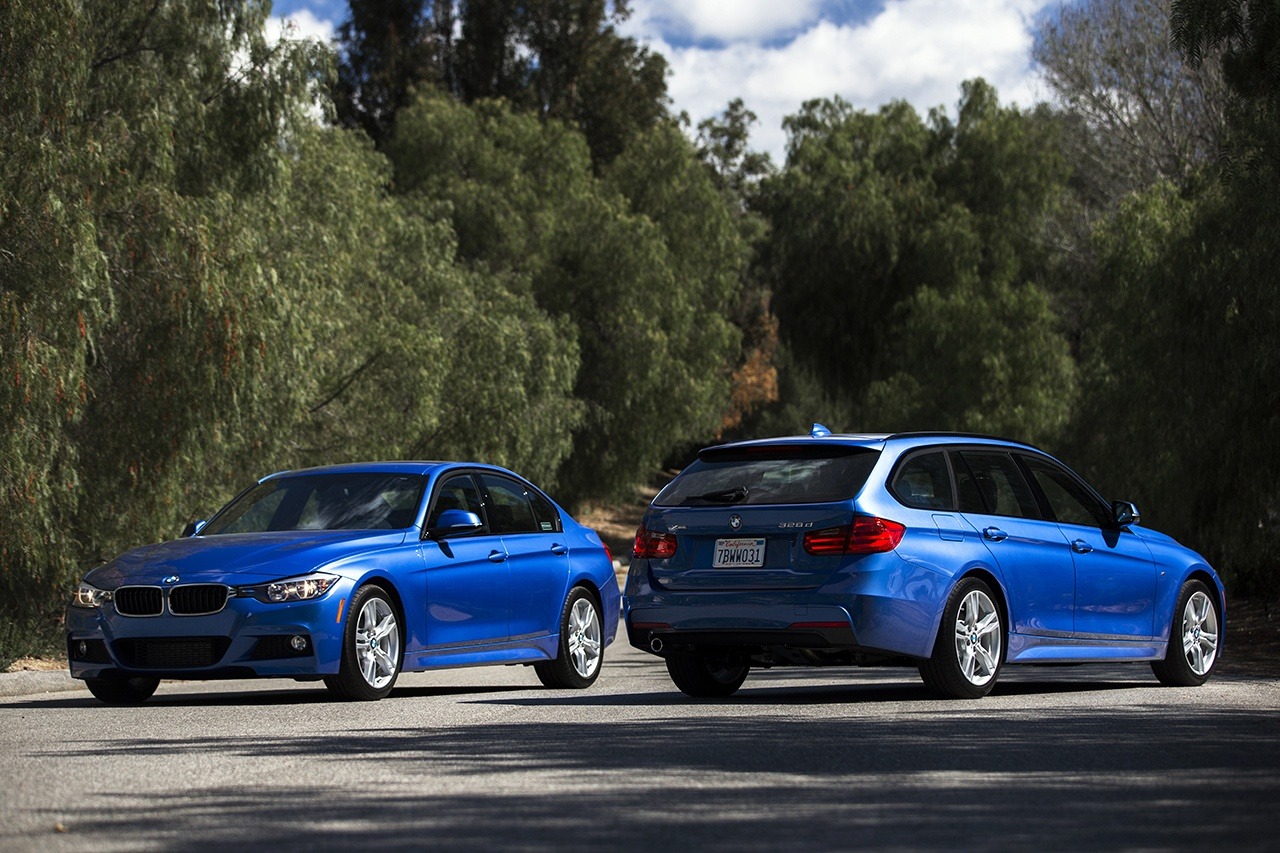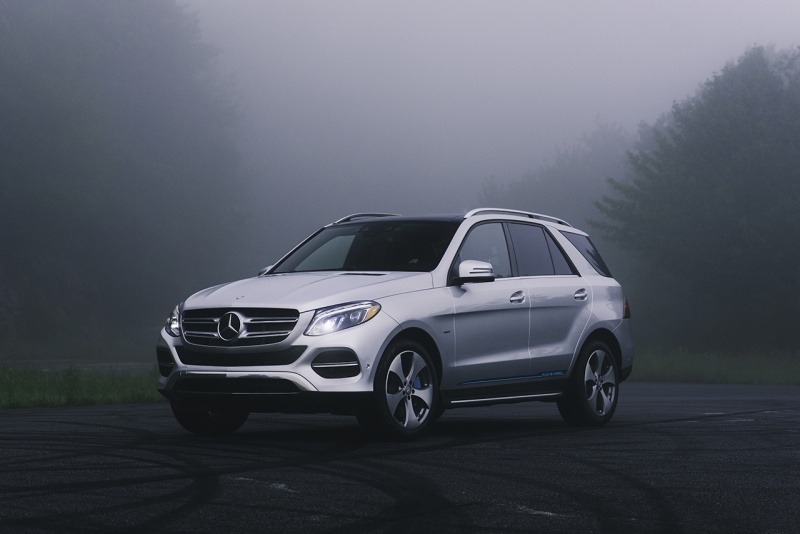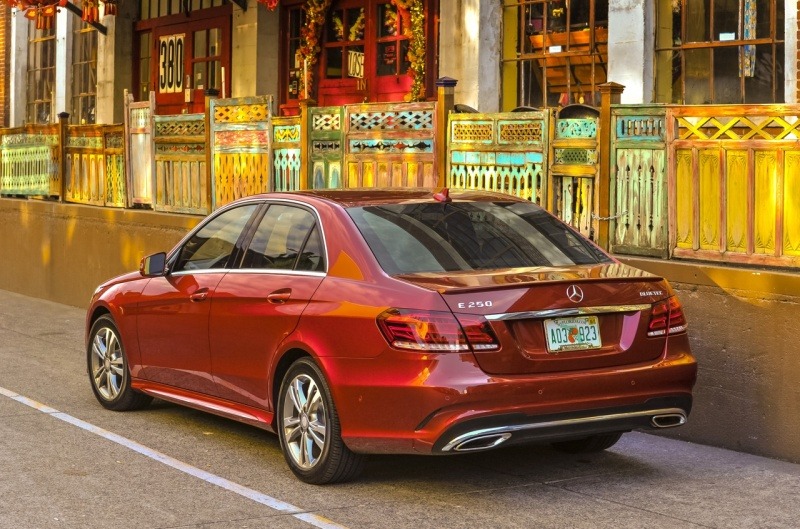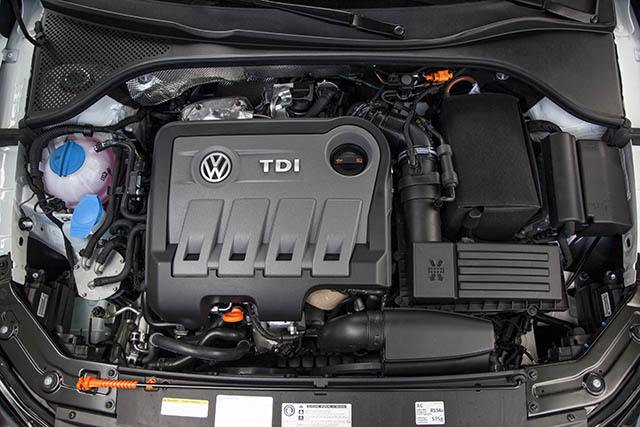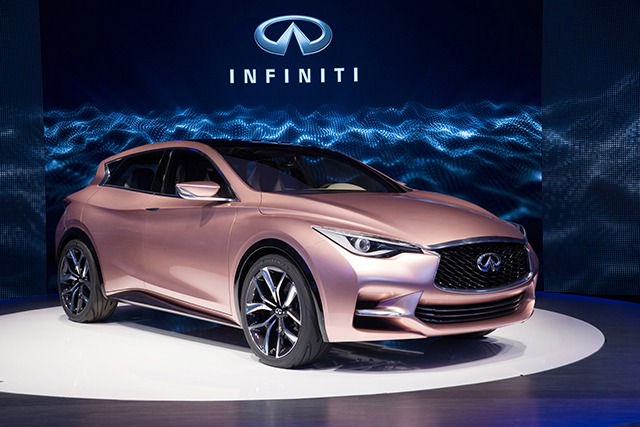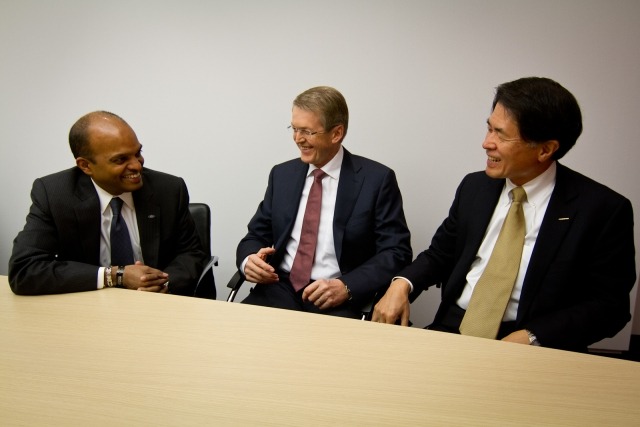Search the Community
Showing results for tags 'Diamler'.
-
About a year ago, European antitrust regulators became very suspicious that BMW, Daimler, and Volkswagen were involved in a longstanding automotive cartel that colluded on restricting certain emissions control devices for the market. Raids were carried out at various facilities, but nothing came out. That changed yesterday as the European Commission has opened a formal investigation. "The Commission is investigating whether BMW, Daimler and VW agreed not to compete against each other on the development and roll-out of important systems to reduce harmful emissions from petrol and diesel passenger cars," said Commissioner Margrethe Vestager, head of competition policy for the European Commission in a statement. "These technologies aim at making passenger cars less damaging to the environment. If proven, this collusion may have denied consumers the opportunity to buy less polluting cars, despite the technology being available to the manufacturers." The technologies in question include selective catalytic reduction systems that reduce the amount of nitrogen oxides from diesel cars, and "Otto" particulate filters that capture particulate emissions from gas vehicles. The commission also revealed the group discussed common requirements for car parts and testing procedures, though there isn't evidence to say if they were illegal or not. It is also mentioned that there was no evidence that the automakers coordinated in the use of defeat devices. Daimler and Volkswagen told Reuters they were cooperating with the commission. BMW said it would continue to support the authority of the commission. Source: Reuters, European Commission Antitrust: Commission opens formal investigation into possible collusion between BMW, Daimler and the VW group on clean emission technology Brussels, 18 September 2018 The European Commission has opened an in-depth investigation to assess whether BMW, Daimler and VW (Volkswagen, Audi, Porsche) colluded, in breach of EU antitrust rules, to avoid competition on the development and roll-out of technology to clean the emissions of petrol and diesel passenger cars. Commissioner Margrethe Vestager, in charge of competition policy, said: "The Commission is investigating whether BMW, Daimler and VW agreed not to compete against each other on the development and roll-out of important systems to reduce harmful emissions from petrol and diesel passenger cars. These technologies aim at making passenger cars less damaging to the environment. If proven, this collusion may have denied consumers the opportunity to buy less polluting cars, despite the technology being available to the manufacturers." In October 2017, the Commission carried out inspections at the premises of BMW, Daimler, Volkswagen and Audi in Germany as part of its initial inquiries into possible collusion between car manufacturers on the technological development of passenger cars. The Commission's in-depth investigation focusses on information indicating that BMW, Daimler, Volkswagen, Audi and Porsche, also called the "circle of five", participated in meetings where they discussed inter alia the development and deployment of technologies to limit harmful car exhaust emissions. In particular, the Commission is assessing whether the companies colluded to limit the development and roll-out of certain emissions control systems for cars sold in the European Economic Area, namely: selective catalytic reduction ('SCR') systems to reduce harmful nitrogen oxides emissions from passenger cars with diesel engines; and 'Otto' particulate filters ('OPF') to reduce harmful particulate matter emissions from passenger cars with petrol engines. The in-depth investigation will aim to establish whether the conduct of BMW, Daimler and VW may have violated EU antitrust rules that prohibit cartels and restrictive business practices, including agreements to limit or control technical development (Article 101 of the Treaty on the Functioning of the European Union). At this stage, the Commission has no indications that the parties coordinated with each other in relation to the use of illegal defeat devices to cheat regulatory testing. The Commission will carry out its in-depth investigation as a matter of priority. The opening of a formal investigation does not prejudge its outcome. Other topics discussed by the companies The Commission's formal investigation concerns solely the emissions control systems identified above. These were only some of the issues discussed by the "circle of five". Numerous other technical topics were discussed, including common quality requirements for car parts, common quality testing procedures or exchanges concerning their own car models that were already on the market. The "circle of five" also had discussions on the maximum speed at which the roofs of convertible cars can open or close, and at which the cruise control will work. Cooperation also extended to the area of crash tests and crash test dummies where the car companies pooled technical expertise and development efforts to improve testing procedures for car safety. At this stage the Commission does not have sufficient indications that these discussions between the "circle of five" constituted anti-competitive conduct that would merit further investigation. EU antitrust rules leave room for technical cooperation aimed at improving product quality. The Commission's in-depth investigation in this case concerns specific cooperation that is suspected to have aimed at limiting the technical development or preventing the roll-out of technical devices. View full article
-
About a year ago, European antitrust regulators became very suspicious that BMW, Daimler, and Volkswagen were involved in a longstanding automotive cartel that colluded on restricting certain emissions control devices for the market. Raids were carried out at various facilities, but nothing came out. That changed yesterday as the European Commission has opened a formal investigation. "The Commission is investigating whether BMW, Daimler and VW agreed not to compete against each other on the development and roll-out of important systems to reduce harmful emissions from petrol and diesel passenger cars," said Commissioner Margrethe Vestager, head of competition policy for the European Commission in a statement. "These technologies aim at making passenger cars less damaging to the environment. If proven, this collusion may have denied consumers the opportunity to buy less polluting cars, despite the technology being available to the manufacturers." The technologies in question include selective catalytic reduction systems that reduce the amount of nitrogen oxides from diesel cars, and "Otto" particulate filters that capture particulate emissions from gas vehicles. The commission also revealed the group discussed common requirements for car parts and testing procedures, though there isn't evidence to say if they were illegal or not. It is also mentioned that there was no evidence that the automakers coordinated in the use of defeat devices. Daimler and Volkswagen told Reuters they were cooperating with the commission. BMW said it would continue to support the authority of the commission. Source: Reuters, European Commission Antitrust: Commission opens formal investigation into possible collusion between BMW, Daimler and the VW group on clean emission technology Brussels, 18 September 2018 The European Commission has opened an in-depth investigation to assess whether BMW, Daimler and VW (Volkswagen, Audi, Porsche) colluded, in breach of EU antitrust rules, to avoid competition on the development and roll-out of technology to clean the emissions of petrol and diesel passenger cars. Commissioner Margrethe Vestager, in charge of competition policy, said: "The Commission is investigating whether BMW, Daimler and VW agreed not to compete against each other on the development and roll-out of important systems to reduce harmful emissions from petrol and diesel passenger cars. These technologies aim at making passenger cars less damaging to the environment. If proven, this collusion may have denied consumers the opportunity to buy less polluting cars, despite the technology being available to the manufacturers." In October 2017, the Commission carried out inspections at the premises of BMW, Daimler, Volkswagen and Audi in Germany as part of its initial inquiries into possible collusion between car manufacturers on the technological development of passenger cars. The Commission's in-depth investigation focusses on information indicating that BMW, Daimler, Volkswagen, Audi and Porsche, also called the "circle of five", participated in meetings where they discussed inter alia the development and deployment of technologies to limit harmful car exhaust emissions. In particular, the Commission is assessing whether the companies colluded to limit the development and roll-out of certain emissions control systems for cars sold in the European Economic Area, namely: selective catalytic reduction ('SCR') systems to reduce harmful nitrogen oxides emissions from passenger cars with diesel engines; and 'Otto' particulate filters ('OPF') to reduce harmful particulate matter emissions from passenger cars with petrol engines. The in-depth investigation will aim to establish whether the conduct of BMW, Daimler and VW may have violated EU antitrust rules that prohibit cartels and restrictive business practices, including agreements to limit or control technical development (Article 101 of the Treaty on the Functioning of the European Union). At this stage, the Commission has no indications that the parties coordinated with each other in relation to the use of illegal defeat devices to cheat regulatory testing. The Commission will carry out its in-depth investigation as a matter of priority. The opening of a formal investigation does not prejudge its outcome. Other topics discussed by the companies The Commission's formal investigation concerns solely the emissions control systems identified above. These were only some of the issues discussed by the "circle of five". Numerous other technical topics were discussed, including common quality requirements for car parts, common quality testing procedures or exchanges concerning their own car models that were already on the market. The "circle of five" also had discussions on the maximum speed at which the roofs of convertible cars can open or close, and at which the cruise control will work. Cooperation also extended to the area of crash tests and crash test dummies where the car companies pooled technical expertise and development efforts to improve testing procedures for car safety. At this stage the Commission does not have sufficient indications that these discussions between the "circle of five" constituted anti-competitive conduct that would merit further investigation. EU antitrust rules leave room for technical cooperation aimed at improving product quality. The Commission's in-depth investigation in this case concerns specific cooperation that is suspected to have aimed at limiting the technical development or preventing the roll-out of technical devices.
-
The project of a trade war between the U.S. and China (along with the European Union) has many automakers on edge. Some are beginning to speak out about the possible dangers it may bring. Mercedes-Benz's parent company, Diamler AG announced yesterday that its full-year earnings will be slightly lower than last year. Their reasoning comes down to consumers in China buying fewer SUVs that are imported from the U.S. Most of Mercedes-Benz SUVs are built in Alabama. “Remember, for those following from a Trump/global free trade perspective, this is now a German car maker, warning on the profits coming from their Alabama-made SUVs, which are then sold/exported into China –- a complicated situation indeed!!” wrote Evercore ISI analyst Arndt Ellinghorst. According to Bloomberg, shares in Diamler dropped 4.4 percent on this announcement. Meanwhile, Volvo Cars CEO Hakan Samuelsson said the trade war could affect plans in the U.S. Speaking at the opening of the Swedish automaker's new assembly plant in South Carolina, Samuelsson told Bloomberg that Volvo would have to limit the number of models it sells due to threat of a 25 percent tariff on imported vehicles. “I would have less models to choose from and they would cost more -- that would be the consequence. Shorter menu and higher prices -- not a very good restaurant,” said Samuelsson. The factory in South Carolina will provide a small relief for Volvo if tariffs do go into place. Small is the key word as LMC Automotive estimates 87 percent of the vehicles Volvo sells in the U.S. next year will come from other places - Sweden and China. Samuelsson also warned that the trade dispute could mess up plans to create up to 4,000 new jobs at the new plant. "If you have trade barriers and restrictions, we cannot create as many jobs as we are planning to," explained Samuelsson. "We want to export and if suddenly China and Europe have very high barriers, it would be impossible. Then you have to build the cars there. And then all cars will be more expensive, you have to invest more tooling and have every model in every country. That's against all the logic of modern economies that trade with each other." Source: Bloomberg, (2), Reuters View full article
-

Diamler and Volvo Begin Bracing For A Possible Trade War
William Maley posted an article in Automotive Industry
The project of a trade war between the U.S. and China (along with the European Union) has many automakers on edge. Some are beginning to speak out about the possible dangers it may bring. Mercedes-Benz's parent company, Diamler AG announced yesterday that its full-year earnings will be slightly lower than last year. Their reasoning comes down to consumers in China buying fewer SUVs that are imported from the U.S. Most of Mercedes-Benz SUVs are built in Alabama. “Remember, for those following from a Trump/global free trade perspective, this is now a German car maker, warning on the profits coming from their Alabama-made SUVs, which are then sold/exported into China –- a complicated situation indeed!!” wrote Evercore ISI analyst Arndt Ellinghorst. According to Bloomberg, shares in Diamler dropped 4.4 percent on this announcement. Meanwhile, Volvo Cars CEO Hakan Samuelsson said the trade war could affect plans in the U.S. Speaking at the opening of the Swedish automaker's new assembly plant in South Carolina, Samuelsson told Bloomberg that Volvo would have to limit the number of models it sells due to threat of a 25 percent tariff on imported vehicles. “I would have less models to choose from and they would cost more -- that would be the consequence. Shorter menu and higher prices -- not a very good restaurant,” said Samuelsson. The factory in South Carolina will provide a small relief for Volvo if tariffs do go into place. Small is the key word as LMC Automotive estimates 87 percent of the vehicles Volvo sells in the U.S. next year will come from other places - Sweden and China. Samuelsson also warned that the trade dispute could mess up plans to create up to 4,000 new jobs at the new plant. "If you have trade barriers and restrictions, we cannot create as many jobs as we are planning to," explained Samuelsson. "We want to export and if suddenly China and Europe have very high barriers, it would be impossible. Then you have to build the cars there. And then all cars will be more expensive, you have to invest more tooling and have every model in every country. That's against all the logic of modern economies that trade with each other." Source: Bloomberg, (2), Reuters -
It seems Volkswagen wasn't the only German automaker that was using a defeat device in their diesel vehicles. Over the weekend, German paper Bild am Sonntag obtained documents that revealed Diamler may have been using illegal software modifications to pass emission tests. U.S. investigators looking into Daimler found two engine management functions, Slipguard: Recognized whether or not the vehicle was being tested in a lab Bit 15: Turned off the emissions cleaning after 26 kilometers (16 miles) of driving Bild also cited emails from Daimler engineers questioning whether or not the functions were legal or not. “The authorities know the documents and no complaint has been filed, The documents available to Bild have obviously selectively been released in order to harm Daimler and its 290,000 employees," a Diamler spokesman told Reuters. The spokesman declined to comment on the content of the documents, saying that it " had agreed upon strict confidentiality with the Department of Justice." Diamler has been under investigation by the U.S. Department of Justice and Stuttgart prosecutors over allegations of possible cheating. Source: Bild via Reuters
- 6 comments
-
- defeat device
- diamler
-
(and 2 more)
Tagged with:
-
It seems Volkswagen wasn't the only German automaker that was using a defeat device in their diesel vehicles. Over the weekend, German paper Bild am Sonntag obtained documents that revealed Diamler may have been using illegal software modifications to pass emission tests. U.S. investigators looking into Daimler found two engine management functions, Slipguard: Recognized whether or not the vehicle was being tested in a lab Bit 15: Turned off the emissions cleaning after 26 kilometers (16 miles) of driving Bild also cited emails from Daimler engineers questioning whether or not the functions were legal or not. “The authorities know the documents and no complaint has been filed, The documents available to Bild have obviously selectively been released in order to harm Daimler and its 290,000 employees," a Diamler spokesman told Reuters. The spokesman declined to comment on the content of the documents, saying that it " had agreed upon strict confidentiality with the Department of Justice." Diamler has been under investigation by the U.S. Department of Justice and Stuttgart prosecutors over allegations of possible cheating. Source: Bild via Reuters View full article
- 6 replies
-
- defeat device
- diamler
-
(and 2 more)
Tagged with:
-
In 2005, Volkswagen was in dire straights. The company was going through a painful restructure and was looking into various ways to get itself back into shape. One of those ways was a possible deal with Daimler on possibly using their diesel technologies. But Volkswagen canceled the talks later that year and worked on their own diesel engines, which led to the cheating software and the mess it finds itself today. Bloomberg has learned from sources about a top-secret plan known as 'Project Tabletop'. The plan, spearheaded by then VW CEO Bernd Pischetsrieder, involved Volkswagen and Daimler possibly collaborating on projects and a possible deal where Volkswagen would get access to Diamler's BlueTec technologies for cleaning up diesel emissions by using urea injection. However, the talks were called off before an important meeting in August 2005. Sources claim that Volkswagen balked at cost of adding BlueTec to their vehicles - about 1,000 euros per car. Plus, VW couldn't lower production costs to compensate for. Instead, Volkswagen would go on its own and continue working on their TDI engines. This got strong internal support from then chairman Ferdinand Piech. But it also brought a fair amount on controversy to Volkswagen's top management. Some believed that Volkswagen wouldn't be able to meet the stringent U.S. standards for diesel vehicles without the BlueTec technologies. Sure enough, in 2006, Volkswagen would begin developing the software cheat that would reduce emissions when it detected specific conditions to know it was being tested. It is unclear if there is a link between the deal falling through and development of the cheat. Source: Bloomberg View full article
- 3 replies
-
- as the diesel emits
- deal
-
(and 5 more)
Tagged with:
-
In 2005, Volkswagen was in dire straights. The company was going through a painful restructure and was looking into various ways to get itself back into shape. One of those ways was a possible deal with Daimler on possibly using their diesel technologies. But Volkswagen canceled the talks later that year and worked on their own diesel engines, which led to the cheating software and the mess it finds itself today. Bloomberg has learned from sources about a top-secret plan known as 'Project Tabletop'. The plan, spearheaded by then VW CEO Bernd Pischetsrieder, involved Volkswagen and Daimler possibly collaborating on projects and a possible deal where Volkswagen would get access to Diamler's BlueTec technologies for cleaning up diesel emissions by using urea injection. However, the talks were called off before an important meeting in August 2005. Sources claim that Volkswagen balked at cost of adding BlueTec to their vehicles - about 1,000 euros per car. Plus, VW couldn't lower production costs to compensate for. Instead, Volkswagen would go on its own and continue working on their TDI engines. This got strong internal support from then chairman Ferdinand Piech. But it also brought a fair amount on controversy to Volkswagen's top management. Some believed that Volkswagen wouldn't be able to meet the stringent U.S. standards for diesel vehicles without the BlueTec technologies. Sure enough, in 2006, Volkswagen would begin developing the software cheat that would reduce emissions when it detected specific conditions to know it was being tested. It is unclear if there is a link between the deal falling through and development of the cheat. Source: Bloomberg
- 3 comments
-
- as the diesel emits
- deal
-
(and 5 more)
Tagged with:
-
G. David Felt Staff Writer Alternative Energy - www.CheersandGears.com Europe's 400 Ultra-Fast Charging Network by 2020 Europe like America has the 3 basic charging standards in play in their fragile network of 2016. These is what we know as the 110, 220 and 440, level 1, 2 and 3 chargers. Yet Europe is not standing by waiting for Tesla or American Auto companies to drive EV auto's. Instead Europe has built the following consortium of Auto companies who have all chosen to contribute an equal amount to building the next generation charger network. VW, GM, BMW, Daimler, FORD, FCA, Hyundai, Volvo and Jaguar Land Rover have choosen to build 400 locations over the next 3 years that will sense and charge up to 350 kW in the period of a quick Coffee break. This is significantly faster and higher than the Tesla 120kW fast charging system. The goal by the European Government is to offer road trip worthy auto's with fast charging to bring less noise and cleaner air to European cities by 2020 and to make the bulk of inner city auto's EV's within 10 years of the fast charging system going live, so by 2030. Diamler is wanting to lead the European charge with their 300+ kilometer EV-CUV This would seem to show that Tesla has had the desired effect of making a market changing revolution of how companies and governments see the future of transportation. Source PM
-
Infiniti and Mercedes-Benz are working on a new vehicle architecture that will underpin four new vehicles, including a new crossover. This information comes courtesy of Johan de Nysschen, the head of Infiniti who was speaking to Bloomberg at the Detroit Auto Show. de Nysschen did not talk about whether the new architecture will be front/all-wheel drive or rear-wheel drive, and how many of those new vehicles would be Infiniti and/or Mercedes-Benz. de Nysschen did say is that first model with this new architecture will appear in 2017. Source: Bloomberg via Automotive News (Subscription Required) William Maley is a staff writer for Cheers & Gears. He can be reached at [email protected] or you can follow him on twitter at @realmudmonster. View full article
- 2 replies
-
- Architecture
- Diamler
-
(and 3 more)
Tagged with:
-

Infiniti, Mercedes-Benz Working On A New Vehicle Architecture
William Maley posted an article in Infiniti
Infiniti and Mercedes-Benz are working on a new vehicle architecture that will underpin four new vehicles, including a new crossover. This information comes courtesy of Johan de Nysschen, the head of Infiniti who was speaking to Bloomberg at the Detroit Auto Show. de Nysschen did not talk about whether the new architecture will be front/all-wheel drive or rear-wheel drive, and how many of those new vehicles would be Infiniti and/or Mercedes-Benz. de Nysschen did say is that first model with this new architecture will appear in 2017. Source: Bloomberg via Automotive News (Subscription Required) William Maley is a staff writer for Cheers & Gears. He can be reached at [email protected] or you can follow him on twitter at @realmudmonster.- 2 comments
-
- Architecture
- Diamler
-
(and 3 more)
Tagged with:
-
By William Maley Staff Writer - CheersandGears.com January 28, 2013 Today Diamler, Ford, and Nissan announced a new partnership to jointly develop a common fuel cell system for vehicle to be ready as early as 2017. The three companies will work together on a common fuel-cell stack and fuel-cell system. Also, the partnership will participate in the adoption of global specifications and component standards, and studying the joint development of other FCEV components. "We are convinced that fuel cell vehicles will play a central role for zero-emission mobility in the future. Thanks to the high commitment of all three partners we can put fuel cell e-mobility on a broader basis. This means with this cooperation we will make this technology available for many customers around the globe," said Prof. Thomas Weber, Member of the Board of Management of Daimler AG, Group Research & Mercedes-Benz Cars Development. Source: Nissan William Maley is a staff writer for Cheers & Gears. He can be reached at [email protected] you can follow him on twitter at @realmudmonster. Press Release is on Page 2 The Strategic Cooperation Between Daimler and the Renault-Nissan Alliance Forms Agreement with Ford to Accelerate Commercialization of Fuel Cell Electric Vehicle Technology Daimler AG, Ford Motor Company and Nissan Motor Co., Ltd., have signed a unique three-way agreement for the joint development of common fuel cell system to speed up availability of zero-emission technology and significantly reduce investment costs Collaboration expected to lead to launch of world's first affordable, mass-market fuel cell electric vehicles as early as 2017 Unique collaboration across three continents and three companies will help define global specifications and component standards Sends clear signal to suppliers, policymakers and the industry to encourage the further development of hydrogen infrastructure worldwide YOKOHAMA, Japan - Daimler AG, Ford Motor Company and Nissan Motor Co., Ltd., have signed a unique three-way agreement to accelerate the commercialization of fuel cell electric vehicle (FCEV) technology. The goal of the collaboration is to jointly develop a common fuel cell electric vehicle system while reducing investment costs associated with the engineering of the technology. Each company will invest equally towards the project. The strategy to maximize design commonality, leverage volume and derive efficiencies through economies of scale will help to launch the world's first affordable, mass-market FCEVs as early as 2017. Together, Daimler, Ford and Nissan have more than 60 years of cumulative experience developing FCEVs. Their FCEVs have logged more than 10 million km in test drives around the world in customers' hands and as part of demonstration projects in diverse conditions. The partners plan to develop a common fuel cell stack and fuel cell system that can be used by each company in the launch of highly differentiated, separately branded FCEVs, which produce no CO2 emissions while driving. The collaboration sends a clear signal to suppliers, policymakers and the industry to encourage further development of hydrogen refueling stations and other infrastructure necessary to allow the vehicles to be mass-marketed. Powered by electricity generated from hydrogen and oxygen, FCEVs emit only water while driving. FCEVs are considered complementary to today's battery-electric vehicles and will help expand the range of zero-emission transportation options available to consumers. "Fuel cell electric vehicles are the obvious next step to complement today's battery electric vehicles as our industry embraces more sustainable transportation," said Mitsuhiko Yama$h!a, Member of the Board of Directors and Executive Vice President of Nissan Motor Co., Ltd., supervising Research and Development. "We look forward to a future where we can answer many customer needs by adding FCEVs on top of battery EVs within the zero-emission lineup." "We are convinced that fuel cell vehicles will play a central role for zero-emission mobility in the future. Thanks to the high commitment of all three partners we can put fuel cell e-mobility on a broader basis. This means with this cooperation we will make this technology available for many customers around the globe," said Prof. Thomas Weber, Member of the Board of Management of Daimler AG, Group Research & Mercedes-Benz Cars Development. "Working together will significantly help speed this technology to market at a more affordable cost to our customers," said Raj Nair, group vice president, Global Product Development, Ford Motor Company. "We will all benefit from this relationship as the resulting solution will be better than any one company working alone." Engineering work on both the fuel cell stack and the fuel cell system will be done jointly by the three companies at several locations around the world. The partners are also studying the joint development of other FCEV components to generate even further synergies. The unique collaboration across three continents and three companies will help define global specifications and component standards, an important prerequisite for achieving higher economies of scale. How a fuel cell electric vehicle works Like today's battery-electric vehicles, FCEVs are more efficient than conventional cars and diversify energy sources beyond petroleum. The electricity for an FCEV is produced on board the vehicle in the fuel cell stack where it is generated following an electro-chemical reaction between hydrogen - stored in a purpose-designed, high-pressure tank in the car - and oxygen from the air. The only by-products are water vapor and heat.
-
By William Maley Staff Writer - CheersandGears.com January 28, 2013 Today Diamler, Ford, and Nissan announced a new partnership to jointly develop a common fuel cell system for vehicle to be ready as early as 2017. The three companies will work together on a common fuel-cell stack and fuel-cell system. Also, the partnership will participate in the adoption of global specifications and component standards, and studying the joint development of other FCEV components. "We are convinced that fuel cell vehicles will play a central role for zero-emission mobility in the future. Thanks to the high commitment of all three partners we can put fuel cell e-mobility on a broader basis. This means with this cooperation we will make this technology available for many customers around the globe," said Prof. Thomas Weber, Member of the Board of Management of Daimler AG, Group Research & Mercedes-Benz Cars Development. Source: Nissan William Maley is a staff writer for Cheers & Gears. He can be reached at [email protected] you can follow him on twitter at @realmudmonster. Press Release is on Page 2 The Strategic Cooperation Between Daimler and the Renault-Nissan Alliance Forms Agreement with Ford to Accelerate Commercialization of Fuel Cell Electric Vehicle Technology Daimler AG, Ford Motor Company and Nissan Motor Co., Ltd., have signed a unique three-way agreement for the joint development of common fuel cell system to speed up availability of zero-emission technology and significantly reduce investment costs Collaboration expected to lead to launch of world's first affordable, mass-market fuel cell electric vehicles as early as 2017 Unique collaboration across three continents and three companies will help define global specifications and component standards Sends clear signal to suppliers, policymakers and the industry to encourage the further development of hydrogen infrastructure worldwide YOKOHAMA, Japan - Daimler AG, Ford Motor Company and Nissan Motor Co., Ltd., have signed a unique three-way agreement to accelerate the commercialization of fuel cell electric vehicle (FCEV) technology. The goal of the collaboration is to jointly develop a common fuel cell electric vehicle system while reducing investment costs associated with the engineering of the technology. Each company will invest equally towards the project. The strategy to maximize design commonality, leverage volume and derive efficiencies through economies of scale will help to launch the world's first affordable, mass-market FCEVs as early as 2017. Together, Daimler, Ford and Nissan have more than 60 years of cumulative experience developing FCEVs. Their FCEVs have logged more than 10 million km in test drives around the world in customers' hands and as part of demonstration projects in diverse conditions. The partners plan to develop a common fuel cell stack and fuel cell system that can be used by each company in the launch of highly differentiated, separately branded FCEVs, which produce no CO2 emissions while driving. The collaboration sends a clear signal to suppliers, policymakers and the industry to encourage further development of hydrogen refueling stations and other infrastructure necessary to allow the vehicles to be mass-marketed. Powered by electricity generated from hydrogen and oxygen, FCEVs emit only water while driving. FCEVs are considered complementary to today's battery-electric vehicles and will help expand the range of zero-emission transportation options available to consumers. "Fuel cell electric vehicles are the obvious next step to complement today's battery electric vehicles as our industry embraces more sustainable transportation," said Mitsuhiko Yama$h!a, Member of the Board of Directors and Executive Vice President of Nissan Motor Co., Ltd., supervising Research and Development. "We look forward to a future where we can answer many customer needs by adding FCEVs on top of battery EVs within the zero-emission lineup." "We are convinced that fuel cell vehicles will play a central role for zero-emission mobility in the future. Thanks to the high commitment of all three partners we can put fuel cell e-mobility on a broader basis. This means with this cooperation we will make this technology available for many customers around the globe," said Prof. Thomas Weber, Member of the Board of Management of Daimler AG, Group Research & Mercedes-Benz Cars Development. "Working together will significantly help speed this technology to market at a more affordable cost to our customers," said Raj Nair, group vice president, Global Product Development, Ford Motor Company. "We will all benefit from this relationship as the resulting solution will be better than any one company working alone." Engineering work on both the fuel cell stack and the fuel cell system will be done jointly by the three companies at several locations around the world. The partners are also studying the joint development of other FCEV components to generate even further synergies. The unique collaboration across three continents and three companies will help define global specifications and component standards, an important prerequisite for achieving higher economies of scale. How a fuel cell electric vehicle works Like today's battery-electric vehicles, FCEVs are more efficient than conventional cars and diversify energy sources beyond petroleum. The electricity for an FCEV is produced on board the vehicle in the fuel cell stack where it is generated following an electro-chemical reaction between hydrogen - stored in a purpose-designed, high-pressure tank in the car - and oxygen from the air. The only by-products are water vapor and heat. View full article


